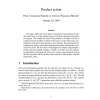23 search results - page 4 / 5 » An Infinite Antichain of Permutations |
109
click to vote
DM
2008
15 years 1 months ago
2008
We introduce random recursive trees, where deterministically weights are attached to the edges according to the labeling of the trees. We will give a bijection between recursive t...
122
Voted
SIAMCOMP
1998
15 years 1 months ago
1998
A chain of a set P of n points in the plane is a chain of the dominance order on P. A k-chain is a subset C of P that can be covered by k chains. A k-chain C is a maximum k-chain ...
121
click to vote
JMLR
2010
14 years 8 months ago
2010
This paper presents a statistical model for expressing preferences through rankings, when the number of alternatives (items to rank) is large. A human ranker will then typically r...
DM
2008
15 years 1 months ago
2008
This paper studies the cycle indices of products of permutation groups. The main focus is on the product action of the direct product of permutation groups. The number of orbits o...
DCC
2008
IEEE
16 years 1 months ago
2008
IEEE
For a graph , subgroups M < G Aut(), and an edge partition E of , the pair (, E) is a (G, M)-homogeneous factorisation if M is vertex-transitive on and fixes setwise each part...

